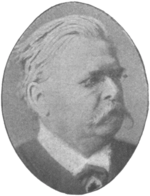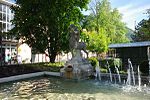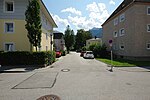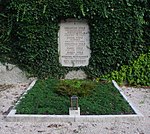List of honorary citizens of Bad Reichenhall
The honorary citizenship is the highest honor that the city of Bad Reichenhall awarded to. It honors personalities who have made lasting outstanding contributions to the reputation and general good of the city of Bad Reichenhall. Since April 18, 2001, the legal basis for the award has been the statute of honor of the city of Bad Reichenhall from March 28 , 2001 . The current no longer contains the privilege of free rides in the public services and in the urban mountain lift, as found in the statutes of June 28, 1962.
Since 1848 the following people have been made honorary citizens. The honorary citizenships granted to Paul von Hindenburg, Adolf Hitler, Franz Ritter von Epp, Ernst Röhm and Adolf Wagner during the Nazi era were revoked on January 4, 1946 and July 10, 1947, respectively.
They are listed chronologically according to the date of award.
The honorary citizens of Bad Reichenhall
| Name, date of birth | function | Award | Remarks | image |
|---|---|---|---|---|
|
Cajetan Freiherr von Tautphoeus * September 3, 1805 in Dillingen an der Donau † November 14, 1885 in Munich |
Royal Bavarian Landrichter zu Reichenhall | March 11, 1848 | Tautphoeus did a lot for the organization of the community budget and for the beautification of the city, which flourished after the fire of 1834 . | |
| Caesar of Aries | Royal Bavarian Landrichter zu Reichenhall | December 31, 1849 | Aries was made an honorary citizen in the revolutionary year of 1848 because of his services to the development of the city and for the maintenance of peace and order . | |
|
Ernst Rinck * December 15, 1801 in Hinterhermsdorf † July 15, 1877 in Reichenhall |
Royal Saxon customs union inspector | August 27, 1869 | After Rinck inherited the Axelmannstein Castle , he had the Achselmannstein brine and whey cure facility built there in 1846 , making him one of the founders of the Reichenhall spa business. He was also significantly involved in the construction of the Dianabath with inhalation and pneumatic chamber. A monument in the park of the Hotel Axelmannstein has been commemorating him since 1896, and Rinckstrasse not far from the hotel is named after him. |

|
|
Maximilian Mayr * August 1804 † September 17, 1879 in Reichenhall |
Kgl. Saline forest master | March 8, 1874 | Mayr was honored for his services to the reconstruction of the city after the fire of 1834 . | |
|
Ferdinand von Geeböck * 1808 † October 21, 1876 in Reichenhall |
Councilor | June 21, 1876 | From 1836 onwards, Geeböck worked as a spa doctor for 42 years and as a hospital doctor and poor doctor for 40 years. In 1848 he wrote a medical treatise on "The Axelmannstein Sanatorium". |
 Memorial plaque in the St. Zeno cemetery |
|
Prince Otto von Bismarck * April 1, 1815 in Schönhausen † July 30, 1898 in Friedrichsruh |
Chancellor | April 1, 1885 | As in many German cities at the time, Bismarck was made an honorary citizen in Reichenhall as co-founder and first chancellor of the new German Reich . He had visited the city several times to take a cure. In 1896, the Bismarck Fountain designed by Theodor Haf with a bronze bust was erected in his honor in Bahnhofstrasse. |
 Bismarck fountain |
|
Anton Alois von Lechner * February 15, 1844 in Altenbach (municipality Kumhausen near Landshut ) † January 7, 1914 in Munich |
Parish priest | August 2, 1889 | Lechner was cathedral capitular and papal house prelate in Munich from 1878 to 1888 . He earned services to Reichenhall as an excellent pulpit speaker who preached tolerance and charity. He campaigned for the beautification of the parish church of St. Nicholas and donated the large bell tower, which was destroyed during the war. The Domprobst-Anton-von-Lechner-Platz (previously: Kirchplatz) in front of the Nikolauskirche is named after him. |
 Domprobst-von-Lechner-Platz |
|
Adolf Schmid * September 29, 1846 in Erlangen † December 14, 1908 in Berlin |
Kgl. Councilor | March 28, 1899 | Schmid worked as a spa doctor in Reichenhall from 1873. In decades of practice, he promoted the development of the health resort. He introduced hydrotherapy and founded a children's sanatorium for scrofulous children. After his death he was buried in Bad Reichenhall. A relief commemorates him in the drinking pavilion in the foyer of the spa park. In addition, a street was named after him. His grave is in the St. Zeno cemetery . |
 Adolf-Schmid-Strasse |
|
Emil Freiherr von Riedel * April 6, 1832 in Kurzenaltheim † August 13, 1906 in Munich |
Bavarian Minister of Finance | November 23, 1900 | Riedel was made an honorary citizen for his services to the health resort through the funding approval for the construction of the health resort in 1900. The Riedelstrasse near the town. The hospital was named after him. |

|
|
Alfred Nathan * December 8, 1870 in Fürth † October 9, 1922 in Bad Reichenhall |
Lawyer, Privy Councilor | November 27, 1906 | Alfred Nathan from Fürth was a great benefactor of the city. He donated significant sums for charitable purposes, such as for the centaur fountain in front of the main train station, a military rest home and the Amalienruhe in Karlstein . Today's Friedrich-Ebert-Allee was named after Nathan. When streets named after Jews were no longer desired during the Nazi regime, Nathan's name also disappeared. Friedrich-Ebert-Allee kept its name even after the end of the Second World War, the former Pfälzer Straße between Traunfeld and Paepkestraße is now called Alfred-Nathan-Straße. His grave is in the old Jewish cemetery in Fürth. |
 Centaur well donated by Nathan |
|
Hermann Ritter von Pfaff * August 20, 1846 in Nuremberg † November 27, 1933 in Munich |
Bavarian Finance Minister and State Councilor | February 16, 1912 | Pfaff was honored for the special promotion of the health resort by granting state subsidies for the construction of the new graduation house and the new foyer. |

|
|
Friedrich Ritter von Hessing * June 19, 1838 in Schönbronn † March 16, 1918 in Göggingen |
Kgl. Councilor, orthopedist | June 25, 1917 | Hessing founded the orthopedic sanatorium in Göggingen in 1866, where numerous surgical devices were developed. In 1875 he had extensive estates built in Reichenhall. He brought numerous princely people and wealthy foreigners to the city. He built a railroad to Friedrichshöhe and the painter's house there. The Hessingsteig is named after him where the railway was located, the hill is still known today as Hessing . |

|
|
Kaspar Harl (also: Caspar Harl ) * May 3, 1856 in Reichenhall † July 12, 1929 in Bad Reichenhall |
Councilor | August 18, 1921 | "In grateful recognition of the great merits that he has done in more than 25 years of tireless and self-sacrificing activity as a senior doctor in the city hospital in the service of suffering humanity, as a dutiful doctor in the city hospital in the service of suffering humanity, as a dutiful and warmhearted doctor Philanthropist has acquired around his hometown. ”Hofrat-Harl-Strasse, located between Kurfürstenstrasse and Maximilianstrasse, is named after Harl. His grave is in the St. Zeno cemetery . |
 Hofrat-Harl-Strasse |
|
Josef Fallbacher * March 22, 1860 in Reichenhall † January 13, 1938 in Chicago |
Hotelier in Chicago and Lake Maria near Chicago | November 30, 1922 | Fallbacher trained as a locksmith in Reichenhall, but then emigrated to the United States in 1883 . During the difficult emergency and inflationary period of 1921-23, he made a name for himself as a benefactor of the city through large donations, as well as sugar and flour shipments for the starving population. The certificate was presented to him during a personal visit on June 17, 1924. Fallbacherstrasse is named after him. |
 Fallbacherstrasse |
|
Franz Xaver Besold * 1870 † October 10, 1927 in Munich |
Insurance director | June 14, 1923 | Besold acted as a benefactor of the city in the difficult post-war period through large foundations for poor children. | |
|
Karl Weiß * April 26, 1885 in Zwiesel † August 25, 1966 in Bad Reichenhall |
Legally qualified 1st mayor | April 26, 1950 | From December 1, 1926, Weiß was the legally qualified 1st Mayor of Bad Reichenhall. Several major projects were implemented under his leadership. The Staatlich-Städtische Kurmittelhaus, the Predigtstuhlbahn , the new municipal hospital , the elevated railway line between the main train station and Kirchberg were built . Other infrastructural measures related to the planned asphalting of the streets and squares in the city center, the addition of street lighting, the expansion of the gas and water pipes and the sewer network, the conversion of the electrical power supply, the expansion of the St. Zeno cemetery , the reconstruction of the burnt-down building yard and the Construction of the city administration building. It is thanks to his initiative that the district was established in 1929 and the garrison was established in 1934. During the period of National Socialism, Weiß was repeatedly demoted by the NSDAP and finally dismissed in 1944. Even before the US troops marched in, he was reinstated in office on May 4, 1945 and later confirmed by the military government. After his retirement in 1946, he again took over the chairmanship of the city's spa and tourist office, which he held before 1933. From 1948 he was also chairman of the district association of the Bavarian Red Cross. Karl-Weiß-Straße is named after him, and his grave is in the St. Zeno cemetery . |
 Grave in the St. Zeno cemetery |
|
Sebastian Stolz * December 20, 1876 in Augsburg † September 20, 1963 in Bad Reichenhall |
Mason foreman, head of the municipal employment office, 2nd mayor | May 24, 1950 | Proud came to Bad Reichenhall in 1900. From 1919 he was head of the municipal employment office, but was removed from office in 1933 for political reasons. He was also a co-founder of the non-profit building cooperative and co-builder of the Glück im Winkel settlement . From 1911 he was a municipal representative and acted as 2nd mayor in the post-war years. After the end of the Second World War he was head of the local health insurance fund. On the occasion of his resignation from office, he was made an honorary citizen in 1919 and in the 1930s because of his great services to the city and the health resort through his influence against radical elements. Sebastian-Stolz-Straße is named after him. |
 Grave in the St. Zeno cemetery |
|
Anton Winkler * January 10, 1907 in Palling † February 23, 1992 in Bad Reichenhall |
Spiritual councilor and dean , city pastor | June 14, 1983 | Winkler was made an honorary citizen for his services in pastoral care and the structural redesign of the upper town with the renovation of the St. Nicholas Church , the new construction of a parish center and the establishment of the parish library. Anton-Winkler-Strasse near the St. Nikolaus Church is named after him. |
 Anton-Winkler-Strasse |
|
Max Neumeyer * September 4, 1920 in Traunstein † May 22, 1993 in Bad Reichenhall |
Oberpostrat, Lord Mayor | April 12, 1988 | During his tenure between 1964 and 1988, Neumeyer had a decisive influence on the face, appearance and importance of Bad Reichenhall and, against frequent opposition, defended, maintained and strengthened the basis of life in the city. |
 Grave in the St. Zeno cemetery |
|
Fritz Hofmann * 1925 in Bergen near Traunstein † October 12, 2008 in Bad Reichenhall |
Town caretaker | Hofmann moved the city's historical collection, which previously only took up one room in the town hall, to the former grain store and over the years expanded it to become today's museum of local history. Over the years, he volunteered to collect extensive information about the history of the city and wrote countless works. His grave is in the St. Zeno cemetery . |
 Grave in the St. Zeno cemetery |
Revoked honorary citizenships
- Paul von Hindenburg (born October 2, 1847 in Posen, † August 2, 1934 at Gut Neudeck)
- President of the empire
- Awarded March 31, 1933, revoked January 4, 1946
- Adolf Hitler (born April 20, 1889 in Braunau am Inn, † April 30, 1945 in Berlin)
- Chancellor
- Awarded March 31, 1933, revoked January 4, 1946
- Franz Ritter von Epp (born October 16, 1868 in Munich; † January 31, 1947 ibid.)
- Reich governor in Bavaria
- Awarded March 31, 1933, revoked January 4, 1946
- Ernst Röhm (born November 28, 1887 in Munich, † July 1, 1934 in Munich)
- Reich Minister and Chief of Staff
- Awarded on August 24, 1933, revoked on July 10, 1947
- Adolf Wagner (born October 1, 1890 in Algringen, Lorraine, † April 12, 1944 in Bad Reichenhall)
- Minister of State
- Awarded on March 9, 1934, revoked January 4, 1946
literature
- Karlheinz Spielmann: Honorary Citizen and Honors in the Federal Republic. 1965
Individual evidence
- ^ Bismarck fountain in Reichenhall . In: daily mail . January 20, 1893, p. 4 ( ANNO - AustriaN Newspapers Online [accessed on May 18, 2020]).
